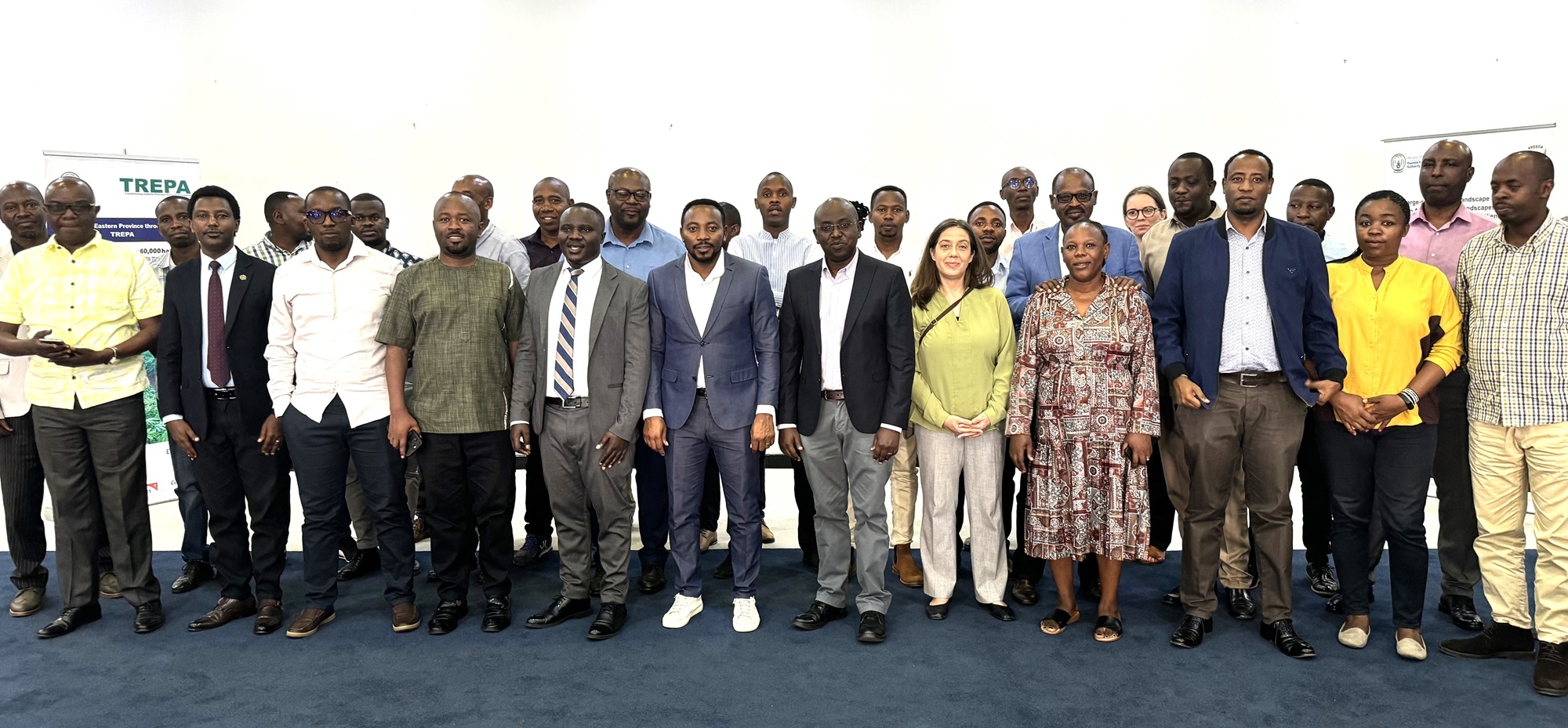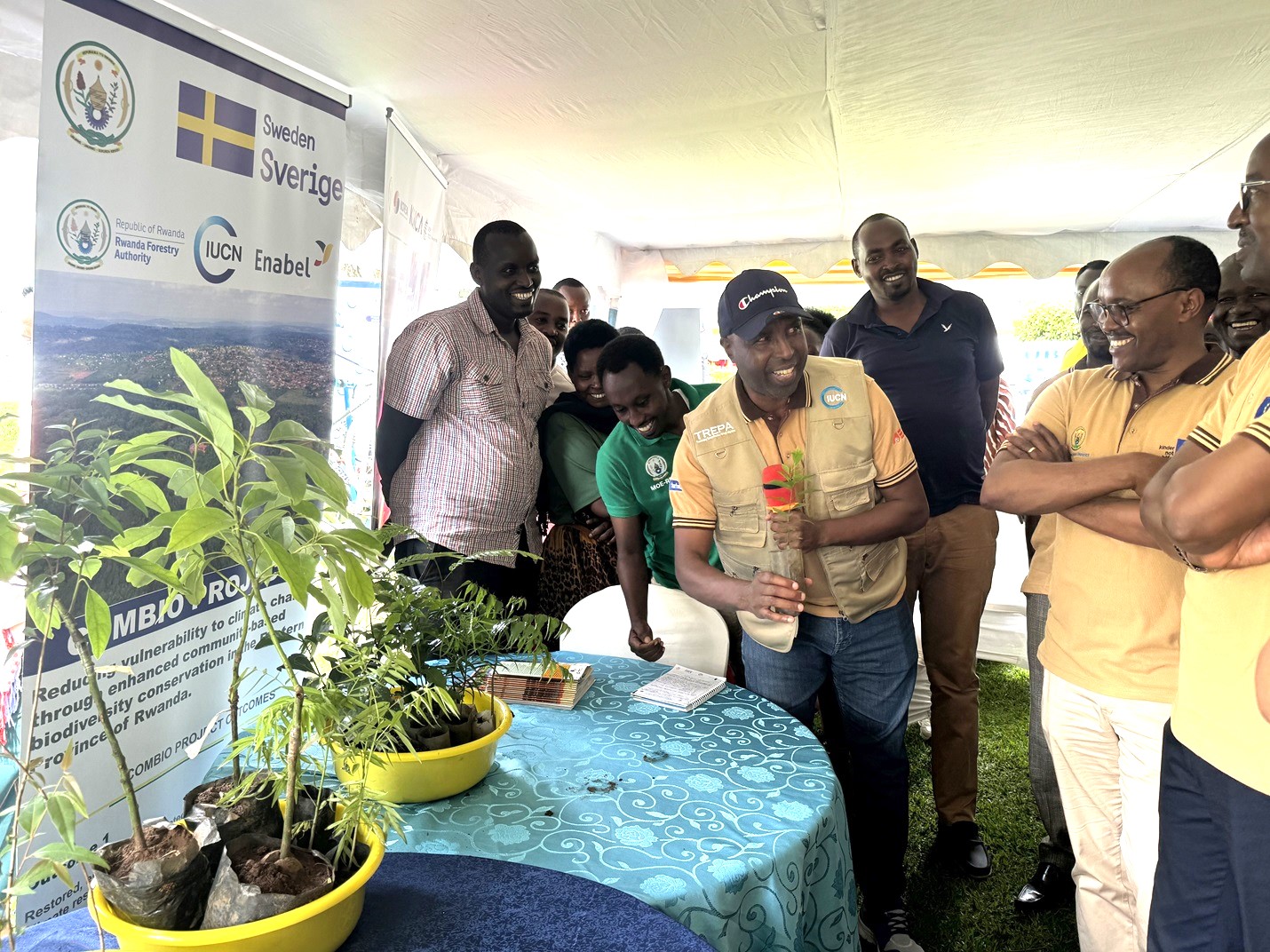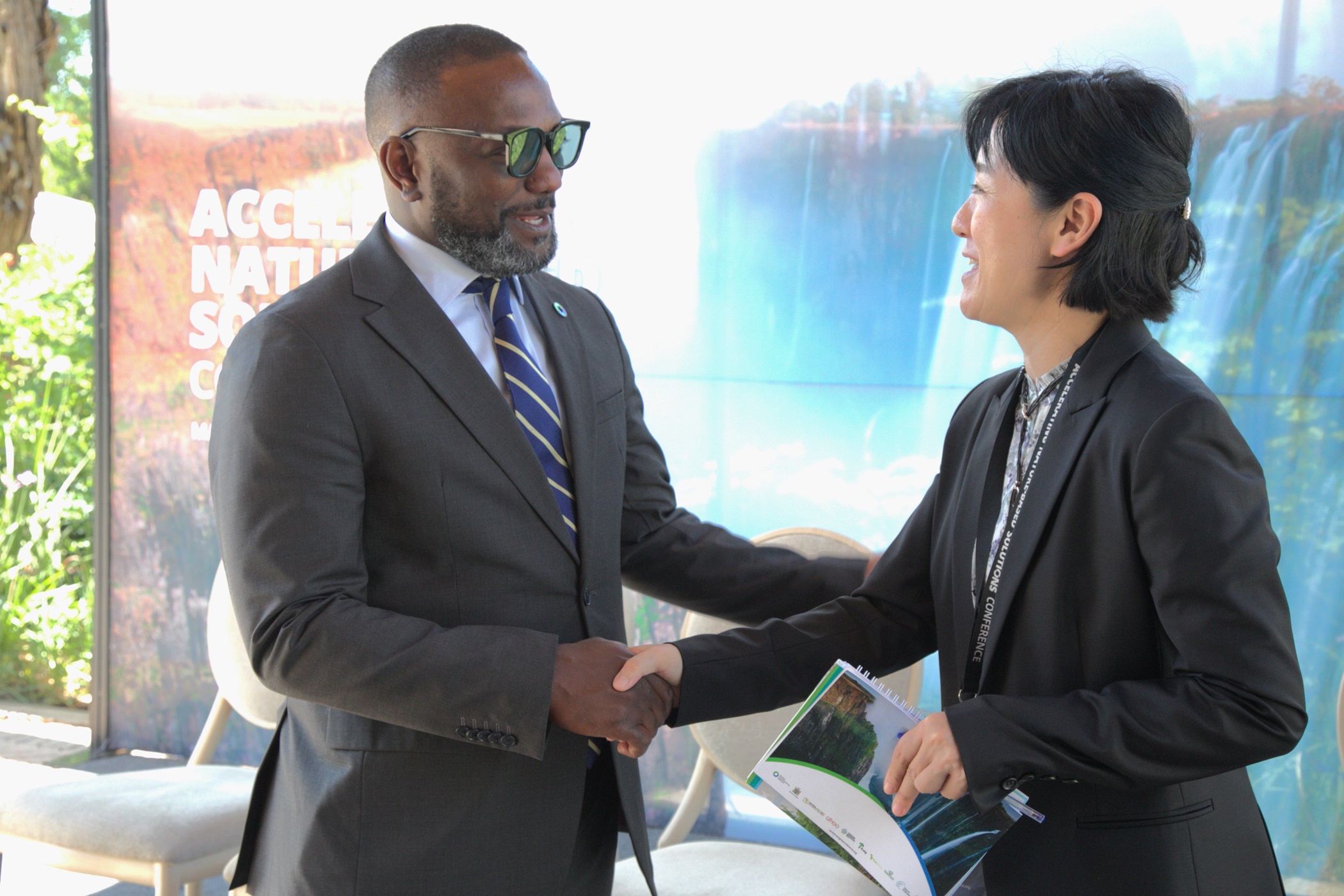IUCN, Enabel, EU, and Ministry of Environment Host Second National Agroforestry Conference in Rwanda
The Ministry of Environment in collaboration with the European Union Delegation to Rwanda, the International Union for Conservation of Nature (IUCN), the Belgian development agency (Enabel), and the International Centre for Research in Agroforestry (CIFOR-ICRAF), along with the Universities of Rwanda, Ghent, and KU Leuven through the European Union-funded project DeSIRA (Development-Smart Innovation through Research in Agriculture), convened the National Agroforestry Conference for the second time.
 Photo: Ms. Kaori Yasuda, the IUCN Rwanda Country Representative, delivered a keynote speech and encouraged attendees to reserve their spots for the upcoming IUCN Africa Conservation Forum, scheduled to be held in Nairobi, Kenya
Photo: Ms. Kaori Yasuda, the IUCN Rwanda Country Representative, delivered a keynote speech and encouraged attendees to reserve their spots for the upcoming IUCN Africa Conservation Forum, scheduled to be held in Nairobi, Kenya
The conference took place in Rwanda from 28 to 29 May 2024 at Serena Hotel.
The conference brought together research and academic institutions, government bodies, farmer organizations, civil society groups, international organizations, private sectors, media, and development partners to share preliminary research results and discuss the applicability of agroforestry solutions to the country.
Various exchanges in this 2-day conference covered several themes regarding the ecosystem services of agroforestry systems, biomass and energy supply potential in agroforestry systems, the socio-economic aspects of agroforestry adoption, agroforestry system monitoring tools, and policy development.
 Photo: The National Agroforestry Conference was officiated by the Hon. Minister of Environment, Dr. Jeanne d'Arc Mujamariya
Photo: The National Agroforestry Conference was officiated by the Hon. Minister of Environment, Dr. Jeanne d'Arc Mujamariya
Minister of Environment, Dr. Jeanne d’Arc Mujawamariya, stated, "Our nation, with its diverse landscapes and agricultural traditions, is at the forefront of addressing the global challenges of climate change and environmental sustainability. As we face the realities of a changing climate, agroforestry emerges as a crucial ally. Trees act as guardians, mitigating the impacts of extreme weather events, regulating temperatures, and sequestering carbon dioxide.
Our commitment to agroforestry is a commitment to biodiversity. By diversifying our landscapes with a mix of crops and trees, we create habitats for diverse plant and animal species. The adoption of agroforestry practices stands as a beacon of hope, offering practical solutions that harmonize the needs of people and prosperity."
In the note to the Press, Ambassador of the European Union to Rwanda, Belen Calvo Uyarra, stated, "In collaboration with our valued partners, we are proud of the EU’s DeSIRA initiative, a beacon of hope for sustainable agriculture and environmental resilience in Rwanda. The government's commitment to agroforestry aligns with our shared vision for a future where climate challenges are met with innovative, research-backed solutions.
 Photo: The Head of Cooperation, Mrs. Michela TOMASELLA, gave a keynote at the National Agroforestry Conference in Kigali, Rwanda
Photo: The Head of Cooperation, Mrs. Michela TOMASELLA, gave a keynote at the National Agroforestry Conference in Kigali, Rwanda
The dedication of the Rwandan government to agroforestry-based restoration is commendable and demonstrates a proactive approach to transforming agriculture and food systems.
Agroforestry, as a Nature-based solution, not only addresses climate change and biodiversity concerns but also fosters poverty reduction.
We believe this gathering will generate valuable knowledge, paving the way for evidence-based policies and contributing to the country's sustainable development goals towards a greener, more resilient future for Rwanda and beyond."
IUCN Rwanda Country Representative, Ms. Kaori Yasuda, said, "Our work has shown that agroforestry-based restoration of degraded agricultural land, a Nature-based Solution, can greatly improve the resilience of farmers’ livelihoods to climate change, while providing co-benefits that include improvements in land health, biodiversity conservation, water resources preservation, and soil erosion control.
A strong collaboration between scientists and policymakers is required to effectively implement research-proven agroforestry options to enhance productive and sustainable transformation of agriculture and food systems in Rwanda.”
 Photo: The conference brought together research and academic institutions, government bodies, farmer organizations, civil society groups, international organizations, private sectors, media, and development partners
Photo: The conference brought together research and academic institutions, government bodies, farmer organizations, civil society groups, international organizations, private sectors, media, and development partners
The Resident Representative of Enabel in Rwanda, Mr. Dirk Deprez, said, “Agroforestry systems play a crucial role in adapting ecosystems and communities to climate change while fostering the development of a green economy. Given its position at the intersection of forestry and agriculture, the successful adoption of good practices by farmers necessitates the seamless integration of agroforestry into national and local forestry and agriculture policies.
This integration requires strategic planning, sustainable fund mobilization, and coordination involving the private sector and carbon market opportunities. Applied research, providing practical solutions tailored to local contexts, is vital for supporting this integration.”
Enabel is dedicated to contributing to this collective effort, drawing on its 10-year experience in Rwanda working with both forestry and agriculture sectors. Our focus lies in innovating agroforestry value chain development to further this important cause.
The National Agroforestry Conference was financially supported through the DeSIRA action research program, which is being jointly implemented by Enabel and IUCN in collaboration with CIFOR-ICRAF and Universities.
 Photo: Dr. Jules Rutebuka, IUCN Regional Sustainable Agriculture Officer and EU-DeSIRA project Manager, delivered a presentation about the project during the conference
Photo: Dr. Jules Rutebuka, IUCN Regional Sustainable Agriculture Officer and EU-DeSIRA project Manager, delivered a presentation about the project during the conference
The project aims to effectively understand and demonstrate the ecological, social, and economic pathways to, and resultant benefits from the scale-up of agroforestry-based restoration and sustainable biomass use, particularly focusing on the Rwandan Eastern province - which presents relatively higher opportunities of agroforestry landscapes restoration with approximately 500,000 ha, and the peri-urban City of Kigali - with an estimated area of approximately 40,000 ha for horticultural value chains development opportunities.
During the National Agroforestry Conference, Jean Aimé Ruticumugambi presented on how biodiversity facilitates crop performance and agroforestry benefits biodiversity, while Julienne Gatesi presented on how agroforestry positively impacts soils quality and soil water conservation, using citizen science in semi-arid regions of Rwanda's Eastern Province.
 Photo: Jean Aimé Ruticumugambi, a PhD student funded by the EU-DeSIRA project, presented during his session at the conference
Photo: Jean Aimé Ruticumugambi, a PhD student funded by the EU-DeSIRA project, presented during his session at the conference
“We have been conducting participatory research, through farmers’ experience and observations, in Eastern Province and peripheral of Kigali to measure soil quality change in agroforestry systems. Farmers appreciated the contribution of agroforestry to runoff control, soil nutrients availability, change of soil color and quality, and soil water storage”, Gatesi said during the conference.
Julienne Gatesi and Jean Aimé Ruticumugambi both PhD students with funds from EU- DeSIRA project are doing action research on impact of agroforestry systems on carbon sequestration, land restoration, biodiversity conservation, and soil and land productivity while at the same time evaluating the social economic aspect of agroforestry on livelihood development.
 Photo: Gatesi Julienne, a PhD student funded by the EU-DeSIRA project, presented during her session at the conference
Photo: Gatesi Julienne, a PhD student funded by the EU-DeSIRA project, presented during her session at the conference
The conference happened in view of the end of the current National Strategy for Transformation (NST 1) and the upcoming NST2 that is expected to start in 2025. The conference also served as a basis to package Rwanda’s information on agroforestry and prepare for the World Agroforestry Congress in 2025 in which the Government of Rwanda is expected to host.
Through collaborative partnerships and concerted efforts, stakeholders aimed to surmount existing challenges and propel the adoption of sustainable agroforestry practices forward, thereby contributing to both agricultural productivity and environmental preservation.
 Photo: The National Agroforestry Conference gathers researchers and scientists from Rwanda and beyond
Photo: The National Agroforestry Conference gathers researchers and scientists from Rwanda and beyond
Media, photos and social media links :
First National Agroforestry Conference: Here
IUCN Rwanda: Here
EU: Here
Enabel: Here
Ministry of Environment: Here
RBA: FULL English News Bulletin of 28.05.2024 from 9 minutes 40 seconds
RBA: LA GRANDE EDITION: 29.05.2024 from 13 minutes 18 seconds
KT Press: Here
TOP AFRICA NEWS: Here
TOP AFRICA NEWS: Here
Photos: Here
...............
IUCN and CNFA- Hinga Wunguke signed MoU to Enhance Climate-Smart Agriculture ahead of National Agroforestry Conference
During the National Agroforestry Conference in Rwanda, the International Union for Conservation of Nature (IUCN), through the Transforming Eastern Province through Adaptation Project (TREPA) funded by the Green Climate Fund (GCF), and Cultivating New Frontiers in Agriculture (CNFA), via the Hinga Wunguke Project, signed a Memorandum of Understanding (MoU) to catalyze systemic change in climate-smart agriculture.
The objective of this partnership is to enhance the resilience of agricultural systems to the effects of climate change in Rwanda.
 Photo: IUCN and CNFA- Hinga Wunguke signed MoU to Enhance Climate-Smart Agriculture in Rwanda
Photo: IUCN and CNFA- Hinga Wunguke signed MoU to Enhance Climate-Smart Agriculture in Rwanda
The MoU, signed by Ms. Kaori Yasuda, IUCN Rwanda Country Representative, and Mr. Daniel Gies, Chief of Party for Hinga Wunguke at Cultivating New Frontiers in Agriculture (CNFA), aims to promote agroforestry practices in Rwanda and sustainable land management techniques. Through collaboration, IUCN and CNFA aspire to establish a more sustainable and resilient agricultural sector capable of withstanding the challenges posed by climate change.
Highlighting the significance of collaboration in addressing climate change and fostering sustainable food systems in Rwanda, IUCN emphasized the importance of innovative solutions and collective action to address the complex challenges confronting Rwandan farmers.
 Photo: Mr. Olivier HABIMANA, Chief of Party for TREPA, showcased the key achievements of TREPA and highlighted the strong collaboration between TREPA and other projects
Photo: Mr. Olivier HABIMANA, Chief of Party for TREPA, showcased the key achievements of TREPA and highlighted the strong collaboration between TREPA and other projects
Disclaimer
Opinions expressed in posts featured on any Crossroads or other blogs and in related comments are those of the authors and do not necessarily reflect the opinions of IUCN or a consensus of its Member organisations.
IUCN moderates comments and reserves the right to remove posts that are deemed inappropriate, commercial in nature or unrelated to blog posts.



